
Recycling textiles isn’t new, but investments point to a trend that is attracting interest that fits well with textiles burgeoning sustainability mindset.
TW Special Report
Recently, Textile World editors have observed an increasing volume of reports of textile recycling projects taking shape. From the inception of new companies and partnerships made, to new plant announcements. When sustainability entered the textile lexicon not that long ago, questions swirled as to what it really meant for the industry. Was sustainability just a fad, or was it the foundation for a new mindset in textile manufacturing?
From product design to the end of a product’s life and disposal — could the industry pivot from largely a cradle-to-grave mentality to a cradle-to-cradle mindset? Was circularity a topic that made for great speeches and presentations, or was it the future of the textile industry?
Recycling as a topic started to take on steam as a sustainability solution once basic challenges were addressed such as which products were reason-able targets for recycling, how could more products fit into a recycling model, and could recycling scale into a manageable manufacturing model.
Those questions are still not fully answered, but this round up highlights just some of the recent investments that go a long way to show that recycling textiles is no longer just speeches and presentations — there are real people, real companies and real investments focused on a circular textile future.
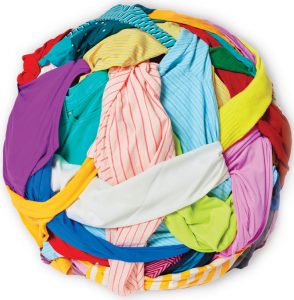
The Hub
Paris-based Reju™ keeps making news. Featured in a recent issue of TW (see “Advancing Textile Circularity: Reju™’s Vision For Sustainable Polyester”, TW, 2024 Quarterly Issue IV), Arnaud Pieton, CEO of Technip Energies, the France-based parent company of Reju, stated: “What has been holding the world back in textile circularity is not a lack of demand for textile recycling, but the lack of a solution that makes recycling of textiles economical on an industrial scale.”
Recently, Reju announced that it has selected the Chemelot Industrial Park for its first industrial scale regeneration center. Located in Sittard, the Netherlands, Chemelot is known as a European industrial park and innovation hub. This announcement follows the opening of Regeneration Hub Zero in Frankfurt late last year.
The company has stated that the new site, named “Regeneration Hub One,” aims to “… regenerate the equivalent of 300 million articles annually that would otherwise end up as textile waste, resulting in a production capacity of 50,000 metric tons of rBHET per year and will then be repolymerized into Reju PET.”
The goal is an output of Reju Polyester, originating from textile waste, that may be reintroduced into the textile lifecycle, through the textile supply chain and into the hands of consumers.
Reju touts its landmark achievements since launch to include:
- Opening the first Regeneration Hub in Frankfurt;
- Partnering with Goodwill and Waste Management in the United States to will advance textile recycling in North America;
- A partnership with Nouvelles Fibres Textiles to automatically sort clothing and disruptors such as zippers and buttons;
- A partnership with Cibutex in Europe to establish an ecosystem among member companies; and
- A partnership with Rematrix in Europe to secure sustainable textile supply.
As Reju continues its recycling mission, it is clearly a company to monitor for textile recycling innovation and achieving scale.
The Polycotton Challenger
Headquartered in Danville, Va., Circ recently made the news when it announced a new, first-of-its-kind facility to be built in Saint-Avold, France. The facility will recycle previously considered unrecyclable post-consumer and post-industrial polycotton textiles. The facility is targeting a processing capacity of 70,000 metric tons of polycotton material per year.
Regarding the announcement, Circ President Peter Majeranowski, said: “This is the moment we’ve been building toward since Circ was founded. Our first full-scale facility will push circular fashion over the critical tipping point in the global economy, proving that the future of textiles can be decarbonized, closer to waste-free, and regenerative by design. It’s not just a major milestone for Circ, but a breakthrough for the entire circular economy at a time when the planet urgently needs scalable climate solutions.”
Circ has patented hydrothermal technology that separates and recovers both polyester and cotton — an innovative technology that address common poly cotton blended fabrics that are said to make up 77 percent of the global textile market.
Syre
In October 2024, Fayetteville, N.C.-based Selenis — supplier of co-polyesters for a diverse range of applications that is part of the IMG Group — and Stockholm-based Syre, a company focused on hyper-scaling textile-to-textile recycling, announced a strategic partnership to establish a textile-to-textile recycling plant in Cedar Creek, N.C., set to be operational by mid-2025. It is estimated the plant will be able to deliver up to 10,000 metric tons of circular polyester annually.
Syre has big plans. According to the company — founded in 2023 —this announcement keeps it on track with its first “blueprint recycling plant” in 2024 to be operational in 2025. Syre plans to start construction of its first gigascale plant, which will be capable of producing 150,000 to 250,000 metric tons of circular polyester, in 2027. Syre’s future plans focus on the construction of multiple plants worldwide. The goal is to produce 3 million metric tons of circular polyester resulting in more than 15 million metrics tons of carbon dioxide equivalents abated in 2032.
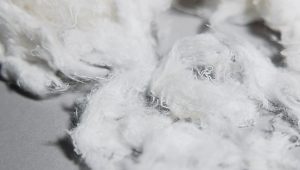
RE&UP’ing Their Game
The Netherlands-based RE&UP has its heritage with Türkiye-based Sanko Textile, known for yarn and fabrics for fashion applications.
RE&UP recently announced a partnership with Italy-based Marchi & Fildi S.p.A. to co-develop a new generation of premium recycled cotton yarns. The collaboration— currently at pre-industrial stage — combines RE&UP’s cutting-edge textile-to-textile recycling technology with Marchi & Fildi’s expertise in sustainable yarn development and manufacturing.
Marchi & Fildi produces yarns for fashion, furnishings, and technical end-uses, and has a long history in Italy’s Biella textiles district. The company has grown into an international group with plants in in Italy, Turkey and Brazil.
The partnership focuses on the codevelopment of a “new generation of premium recycled cotton yarns.”
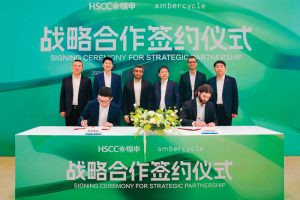
Ambercycle Forms More Partnerships
Los Angeles-based Ambercycle continues to expand its recycling mission. Established in 2015, the company uses molecular regeneration technology and produces a flag-ship regenerated polyester product called cycora®.
Ambercycle has a track record of significant partnerships with companies including South Korea-based Hyosung TNC and Taiwan-based Shinkong Synthetic Fibers Corp.
Recently the company joined with Highsun Holding Group (HSCC). Co-founder and CEO of Ambercycle, Shay Sethi, said of the partnership with HSCC: “Scaling textile-to-textile solutions requires deep partnerships, innovation, and development of the global apparel value chain to work in harmony with the planet. By partnering with HSCC, we’re establishing a foundational partnership for circular systems to work at scale. This is how we turn circularity from an industry-wide ambition into a global reality.”
Renewing Cellulose Fiber
Circulose AB, with its history beginning with Sweden-based textile recycling company Renewcell, has recently reached a strategic partner-ship agreement with China-based cellulose fiber producer Tangshan Sanyou Chemical Fiber.
According to Circulose, this collaboration marks a significant milestone in the commercialization and scaling of CIRCULOSE® fiber, while also driving Tangshan Sanyou’s brand toward greater international recognition. The two companies will work together to ensure that ReVisco™ fibers, produced using CIRCULOSE pulp, maintain a focus on “quality, supply capacity, and pricing, thereby advancing both brands in the high-quality and innovative development of circular and renewable materials.”
“Tangshan Sanyou has always believed in the strong potential of recycling cotton textile waste, which is essential for fostering a green and sustainable industry,” said Zhang Dongbin, executive vice president of Tangshan Sanyou Chemical Fiber. “We have unwavering confidence in the market potential of CIRCULOSE and its new strategic direction, and we are excited about our future collaboration.”
Separating Elastic From Nylon
Earlier this year, Italy-based Aquafil announced, “the world’s first demonstration plant capable of chemically separating elastic fibers from nylon.”
This innovative technology addresses the complex challenge of elastic/nylon separation, which according to the company, opens the door to new possibilities in recycling and circularity.
According to Aquafil, in 2013 it partnered with the Georgia Institute of Technology to study solutions for recycling mixed fibers, which in its words was “a task long deemed insurmountable.”
In 2022, with a new patent filing, a refined process brought the company closer to a solution. Nylon recovered using the process will be regenerated at Aquafil’s ECONYL® plant.
Of this achievement, Aquafil CEO Giulio Bonazzi said, “This milestone demonstrates how cutting-edge technology can tackle even the toughest environmental challenges — turning waste into value and advancing the shift to a truly circular economy.”
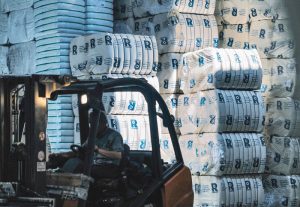
Recovering Poly Cotton Blends Without Separation
Spain-based Recover™, a producer of recycled cotton fiber and cotton fiber blends, announced the opening of a manufacturing facility in Vietnam late last year.
The 14,000-square-meter plant will utilize Recover’s recycling technology initially operating with two state-of-the-art recycling lines. Annual production capacity of 10,000 metric tons is anticipated.
One of the facility’s primary products will be RMix, Recover’s recycling solution for cotton-polyester blends, which eliminates the need to separate fibers, overcoming a long-standing industry challenge in polycotton recycling, according to the company.
The location in Vietnam’s Dong Nai province was chosen because of Vietnam’s substantial role in the global textile industry as the third-largest textile exporter worldwide. Recover reported: “This latest facility in Vietnam represents the next step in the company’s ambitious expansion plans, aiming to expand to new global markets.”
Recover’s first expansion beyond Spain was a second plant in 2022 located in Bangladesh.
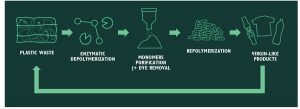
Samsara Eco On The Move
Samsara Eco recently announced it had secured a commercialization partner. The Australia-based company, recently profiled in TW, (see “Samsara Eco: Commercializing Nylon 6,6 Recycling,” TW, 2025 Quarterly Issue I) is partnering with KBR Sustainable Technology Solutions to design its first-of-a-kind plastics and textile enzymatic recycling plant, which is set for completion in early 2028.
According to Samsara, “Samsara Eco’s enzymatic recycling technology aims to create a continuous recycling loop for some of the most common types of plastic and synthetic fiber materials that have traditionally been difficult or impossible to recycle. Powered by Samsara Eco’s proprietary AI platform, the company’s patented enzymes break down plastic to its original building blocks (monomers) which aim to allow plastics to be continuously remanufactured into new products without degradation in quality and with a low carbon footprint.”
Under the agreement, KBR will perform a front-end engineering design, or pre-FEED, for the project by the end of the second quarter of 2025. The company’s technical and commercial experts will then deliver a FEED engineering package for the process design to build a 20,000 metric tons per year commercial facility for nylon 6,6.
“KBR is uniquely equipped to deliver world-class solutions that help our customers bring sustainable technology to market, and we are thrilled to support Samsara Eco on this unique opportunity,” Jay Ibrahim, president, KBR.
Notably, last year, Samsara introduced the first enzymatically recycled nylon 6,6 product in partnership with clothing brand lululemon — the iconic Swiftly Tech Long-Sleeve Top. It also launched the first product made from enzymatically recycled polyester, creating lululemon’s limited edition Packable Anorak jacket.
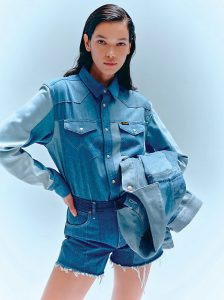
Accelerating Circularity
It is hard to discuss the impact of textile recycling without mentioning Campbell Hall, N.Y. based Accelerating Circularity.
Founded in 2019, the nonprofit organization has been on a mission to refashion the textile industry with a focus on new supply chains and business models that turn textile waste into mainstream raw materials and, with a stakeholder approach, set in motion a circular textile economy.
Accelerating Circularity achievements in building coalitions, receiving notable grants, and publishing findings are worth commending.
Recently, the Wrangler x Accelerating Circularity jeans collaboration was announced in conjunction with Walmart.
According to Accelerating Circularity: “The Wrangler x Accelerating Circularity jeans contain 26-percent recycled cotton — 50-percent post-consumer, 50-percent post-industrial — alongside virgin cotton and elastane for stretch, setting a new bench-mark for post-consumer recycled content in commercially available denim. This project was made possible through collaboration across the textile supply chain trial members, including collection by Bank & Vogue (post-consumer) and Martex (post-industrial); mechanical recycling by Giotex & Estopas; yarn production by Parkdale; and fabric production by Cone Denim.”
Karla Magruder, founder of Accelerating Circularity, commented on the project saying: “This launch is a proof point that circularity is not just a concept — it’s happening now. Through collaboration across the supply chain, we’ve shown that used textiles can become a viable feed-stock for new products at scale.”
As brands, retailers, and manufacturers take interest and participate, recycling textiles may just be no longer just be a topic of speeches and presentations, and circular textile future might just be taking hold.
2025 Quarterly Issue II




